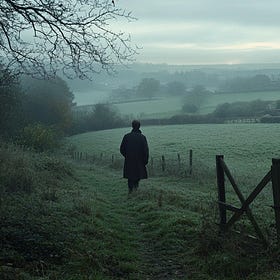Sometimes it takes a nudge—from a fellow writer, a reader, or the soft pressure of an unasked question—to return to a moment you thought had already spoken for itself. For me, that nudge came from Melanie Sumner, who wondered what more there was to say about Helen. About June. About the way we move through each other’s lives, quietly and with consequence.
This is the first of two companion pieces.
This one is about Helen.
The next is all about June.
Together, they drift behind She Stayed for Tea—not as explanations, but as imagined prequels. Fragments of what might have brought two women to the same quiet door.
Presence, Not Permanence
Helen met Simon in that liminal hour between services—after the closing prayer at Ragged School, before the kettle boiled at Bridge Street. It was Nick who had introduced her, offhandedly, as if naming a song you thought the other might like. Simon had nodded, polite, unreadable. But he didn’t look at her the way Nick did. That felt like a relief.
She noticed him properly during the walk in Ashover. He had a quietness she recognized—not shyness, but distance. Like someone watching the world through a steamed-up window. His grandmother had packed him a cheese sandwich wrapped in wax paper. She remembered thinking that was such a lonely thing—the kind of meal you make for yourself, but label as care.
Helen was twenty-three, with her own car and a head full of half-formed plans. She worked as a dental technician, where she spent her days crafting crowns and bridges with careful precision. At church, she was adored and unclaimed, which in some circles was worse than being invisible. The boys her age had either left faith or left town. And Nick—earnest, godly, kind Nick—wanted her like a man who’d mistaken longing for compatibility. He made her feel chosen, but not known.
Simon, on the other hand, didn’t try to impress her. His smiles were rare, and when they came, they felt like something hard-won. That first evening, they sat on the edge of a low stone wall watching the others chase each other through sheep fields, burning off sugar and scripture. He told her about his grandmother. He didn’t mention his parents. She didn’t ask.
Each week, he seemed thinner—less there. Fellowship wasn’t the draw. Obligation, maybe. Or inertia. And yet, when she sat beside him, his body stilled. His breathing changed. Like maybe, for a moment, her presence didn’t hurt.
She kissed him in the car, parked just beyond the reach of the streetlight. It was raining, and the windows fogged quickly. Outside, rain whispered down the bonnet like something unsayable. His lips were soft, uncertain. His hand, when it moved to her waist, trembled like someone reaching for something they weren’t sure they deserved. She didn’t ask what he wanted. She let the silence fill the space where their intentions should have been.
It wasn’t love. But it wasn’t nothing.
June noticed. She always noticed. In the backseat of the Beetle, she watched without comment. At the youth service, she stayed behind to tidy up hymnals while Helen lingered in the foyer, waiting to see if Simon would walk her to the car. He didn’t.
That night, after another youth meeting spilled into damp streets, they waited for the others outside the chip shop. June leaned against the wall beside Helen and said, "Do you ever feel like you're doing all the talking just to hear yourself echo?"
Helen gave a tired smile. "Only when I want something back I’m not getting."
June shrugged. "He’s sweet. But I don’t think he sees you. Not really."
Helen nodded, exhaling slowly. "Maybe I’m not meant to be seen. Maybe just... felt."
They stood quietly, watching the drizzle gather in little puddles by the kerb. That was the closest they ever came to discussing it.
When Simon's grandmother died, he disappeared from church. First one Sunday, then the next. Nick asked around. Helen drove past his street but didn’t stop. The curtains were always drawn.
She never officially ended things. There was no argument, no scene. Just a slow erosion of contact. A week turned into three. A skipped Bible study became a silence. When she saw him again, months later, he was on the other side of the high street—laughing too loudly, arm slung around a girl with bottle-blonde hair, flanked by friends who looked nothing like church. She turned down a side street before he could see her. Not healed, exactly, but closed.
June never mentioned it. But Helen knew she saw. Knew she’d watched her try to salvage a boy and found only quiet in return.
She thought once about writing. About fixing things that didn’t come with molds or diagrams. But she went back to crowns and bridges instead.
Sometimes, in the quiet after work or during the long glide between errands, Helen would remember the way Simon had once touched her hand—like it was both a question and an answer. She had offered presence, not permanence. That was all she had.
And though it wasn’t enough to hold anything lasting, it had held something.
A flicker. A stillness. The faint warmth of something almost understood.
Not Mine to Hold
The first companion piece followed Helen—full of longing, resolve, and the ache of quiet misrecognition. This one belongs to June. Where Helen offered presence, June offered something closer to insistence. Both believed they were helping. Neither was asked.




